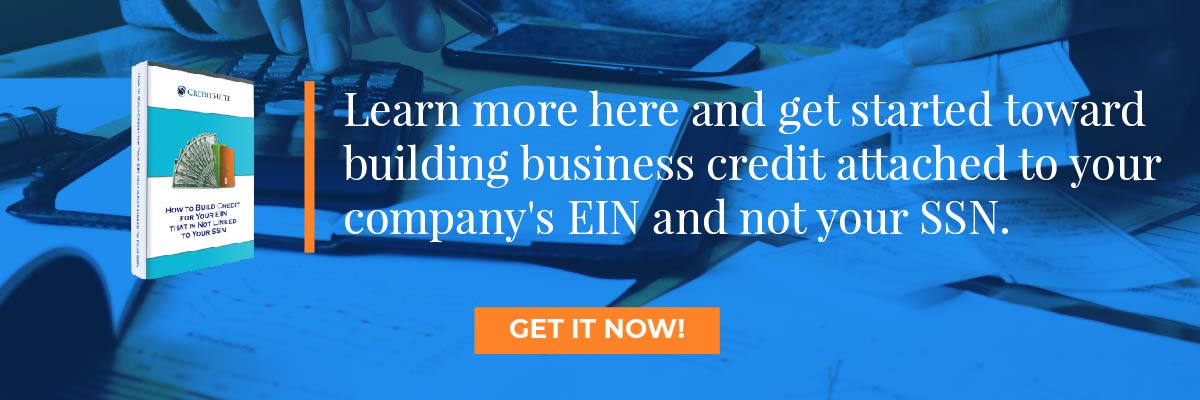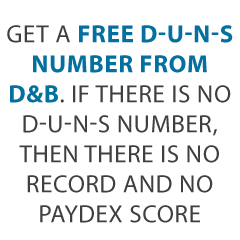- Connect With Us!
- (877) 600-2487
- info@creditsuite.com
How to Easily and Quickly Build Your Business Credit
Published By Janet Gershen-Siegel at October 15th, 2017
You Can Quickly Build Your Business Credit
You can easily and quickly build your business credit. Here’s how.
Company credit is credit in a company’s name. It doesn’t tie to a business owner’s individual credit, not even if the owner is a sole proprietor and the solitary employee of the small business.
As such, a business owner’s business and consumer credit scores can be very different. Here’s how you can quickly build your business credit.
Quickly Build Your Business Credit: The Advantages
Since business credit is distinct from consumer, it helps to protect a small business owner’s personal assets, in the event of legal action or business insolvency.
Also, with two separate credit scores, an entrepreneur can get two separate cards from the same vendor. This effectively doubles buying power.
Another benefit is that even start-ups can do this. Going to a bank for a business loan can be a formula for frustration. But building company credit, when done right, is a plan for success.
Consumer credit scores depend on payments but also additional components like credit usage percentages.
But for small business credit, the scores really just depend on if a company pays its bills on time.
Quickly Build Your Business Credit: The Process
Building company credit is a process, and it does not happen automatically. A company has to actively work to build small business credit.
Having said that, it can be done readily and quickly, and it is much speedier than establishing individual credit scores.
Vendors are a big part of this process.
Undertaking the steps out of sequence will result in repetitive rejections. No one can start at the top with small business credit. For instance, you can’t start with retail or cash credit from your bank. If you do, you’ll get a denial 100% of the time.
Quickly Build Your Business Credit: Start with Small Business Fundability
A small business has to be fundable to lenders and merchants.
Therefore, a small business will need a professional-looking website and e-mail address. And it needs to have website hosting bought from a company such as GoDaddy.
And, business phone and fax numbers need to have a listing on ListYourself.net.
Likewise, the business phone number should be toll-free (800 exchange or similar).
A company will also need a bank account dedicated strictly to it, and it has to have all of the licenses essential for operation.
Licenses
These licenses all have to be in the exact, correct name of the business. And they must have the same small business address and phone numbers.
So note, that this means not just state licenses, but possibly also city licenses.
Learn more here and get started toward building company credit.
Quickly Build Your Business Credit: Start Dealing with the IRS
Visit the IRS website and acquire an EIN for the small business. They’re free of charge. Choose a business entity such as corporation, LLC, etc.
A business can start off as a sole proprietor. But they will more than likely wish to change to a form of corporation or an LLC.
This is in order to minimize risk. And it will maximize tax benefits.
A business entity will matter when it concerns tax obligations and liability in the event of litigation. A sole proprietorship means the business owner is it when it comes to liability and taxes. No one else is responsible.
Sole Proprietors Take Note
If you run a company as a sole proprietor, then at the very least be sure to file for a DBA. This is ‘doing business as’ status.
If you do not, then your personal name is the same as the business name. Consequently, you can end up being personally responsible for all company financial obligations.
Additionally, according to the Internal Revenue Service, using this arrangement there is a 1 in 7 probability of an IRS audit. There is a 1 in 50 possibility for corporations! Avoid confusion and considerably decrease the chances of an Internal Revenue Service audit simultaneously.
Quickly Build Your Business Credit: Kicking Off the Process
Start at the D&B website and get a cost-free D-U-N-S number. A D-U-N-S number is how D&B gets a small business in their system, to generate a PAYDEX score. If there is no D-U-N-S number, then there is no record and no PAYDEX score.
Once in D&B’s system, search Equifax and Experian’s web sites for the business. You can do this at fastcs.wpengine.com/reports If there is a record with them, check it for accuracy and completeness. If there are no records with them, go to the next step in the process.
In this way, Experian and Equifax will have activity to report on.
Vendor Credit Tier
First you need to build trade lines that report. This is also referred to as the vendor credit tier. Then you’ll have an established credit profile, and you’ll get a business credit score.
And with an established business credit profile and score you can begin to acquire credit in the retail and cash credit tiers.
These kinds of accounts have the tendency to be for the things bought all the time, like marketing materials, shipping boxes, outdoor work wear, ink and toner, and office furniture.
But to start with, what is trade credit? These trade lines are credit issuers who will give you preliminary credit when you have none now. Terms are frequently Net 30, rather than revolving.
Hence, if you get an approval for $1,000 in vendor credit and use all of it, you need to pay that money back in a set term, like within 30 days on a Net 30 account.
Details
Net 30 accounts must be paid in full within 30 days. 60 accounts must be paid fully within 60 days. Unlike with revolving accounts, you have a set time when you have to pay back what you borrowed or the credit you used.
To kick off your business credit profile properly, you need to get approval for vendor accounts that report to the business credit reporting agencies. When that’s done, you can then use the credit.
Then pay back what you used, and the account is on report to Dun & Bradstreet, Experian, or Equifax.
Vendor Credit Tier – It Makes Sense
Not every vendor can help like true starter credit can. These are vendors that will grant an approval with a minimum of effort. You also need them to be reporting to one or more of the big three CRAs: Dun & Bradstreet, Equifax, and Experian.
You want 5 to 8 of these to move onto the next step, which is the retail credit tier. But you may have to apply more than one time to these vendors. So, this is to prove you are trustworthy and will pay in a timely manner. Here are some stellar choices from us: https://oldcs.creditsuite.com/blog/5-vendor-accounts-that-build-your-business-credit/
Retail Credit Tier
Once there are 5 to 8 or more vendor trade accounts reporting to at least one of the CRAs, then progress to the retail credit tier. These are companies such as Office Depot and Staples.
Just use your SSN and date of birth on these applications for verification purposes. For credit checks and guarantees, use the small business’s EIN on these credit applications.
One example is Lowe’s. They report to D&B, Equifax and Business Experian. They need to see a D-U-N-S and a PAYDEX score of 78 or more.
Fleet Credit Tier
Are there 8 to 10 accounts reporting? Then progress to the fleet credit tier. These are service providers like BP and Conoco. Use this credit to buy fuel, and to fix, and maintain vehicles. Only use your SSN and date of birth on these applications for verification purposes. For credit checks and guarantees, make certain to apply using the business’s EIN.
One such example is Shell. They report to D&B and Business Experian. They need to see a PAYDEX Score of 78 or better and a 411 company phone listing.
Shell might claim they want a certain amount of time in business or revenue. But if you already have enough vendor accounts, that won’t be necessary. And you can still get approval.
Learn more here and get started toward building company credit.
Cash Credit Tier
Have you been responsibly handling the credit you’ve gotten up to this point? Then move onto the cash credit tier. These are businesses such as Visa and MasterCard. Only use your Social Security Number and date of birth on these applications for verification purposes. For credit checks and guarantees, use your EIN instead.
One example is the Fuelman MasterCard. They report to D&B and Equifax Business. They want to see a PAYDEX Score of 78 or better. And they also want you to have 10 trade lines reporting on your D&B report.
Plus, they want to see a $10,000 high credit limit reporting on your D&B report (other account reporting).
In addition, they want you to have an established small business.
These are companies such as Walmart and Dell, and also Home Depot, BP, and Racetrac. These are usually MasterCard credit cards. If you have 14 trade accounts reporting, then these are feasible.
Learn more here and get started toward building company credit.
Quickly Build Your Business Credit: Monitor Your Business Credit
Know what is happening with your credit. Make sure it is being reported and deal with any errors as soon as possible. Get in the habit of checking credit reports and digging into the particulars, and not just the scores.
We can help you monitor business credit at Experian and D&B for only $24/month. See: fastcs.wpengine.com/monitoring.
At Equifax, you can monitor your account at: www.equifax.com/business/business-credit-monitor-small-business. Experian and Equifax cost about $19.99.
Update Your Data
Update the information if there are inaccuracies or the info is incomplete.
Quickly Build Your Business Credit: Fix Your Business Credit
So, what’s all this monitoring for? It’s to contest any mistakes in your records. Mistakes in your credit report(s) can be corrected. But the CRAs usually want you to dispute in a particular way.
Disputes
Disputing credit report errors typically means you mail a paper letter with duplicates of any proofs of payment with it. These are documents like receipts and cancelled checks. Never send the originals. Always mail copies and keep the originals.
Fixing credit report errors also means you precisely itemize any charges you dispute. Make your dispute letter as understandable as possible. Be specific about the concerns with your report. Use certified mail so that you will have proof that you sent in your dispute.
Quickly Build Your Business Credit: A Word
Always use credit smartly! Never borrow more than what you can pay off. Track balances and deadlines for payments. Paying off on time and fully will do more to increase business credit scores than almost anything else.
Growing business credit pays off. Good business credit scores help a small business get loans. Your lender knows the small business can pay its financial obligations. They understand the business is bona fide.
The small business’s EIN connects to high scores and loan providers won’t feel the need to demand a personal guarantee.
Quickly Build Your Business Credit: Takeaways
Business credit is an asset which can help your small business for years to come. Learn more here and get started toward building company credit.

 " class="attachment-blog-single size-blog-single wp-post-image" alt="Get Business Credit Cards for New Businesses Credit Suite-Business Line of Credit Decoded" title="Get Business Credit Cards for New Businesses">>
" class="attachment-blog-single size-blog-single wp-post-image" alt="Get Business Credit Cards for New Businesses Credit Suite-Business Line of Credit Decoded" title="Get Business Credit Cards for New Businesses">>
